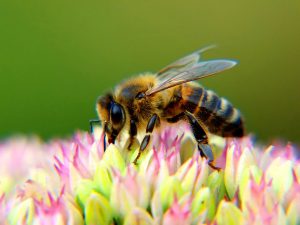Researchers from Indiana University say they have identified a specific bacterial microbe that, when fed to honey bee larvae, can reduce the effects of nutritional stress on developing bees — one of the leading causes of honey bee decline.
Their paper titled, Honey bee symbiont buffers larvae against nutritional stress and supplements lysine, was published in the International Society for Microbial Ecology Journal.
Because they will pollinate almost anything, honey bees are extremely useful for agriculture and play a major role in food security. But concerns over their decline has persisted for decades, with one of the most extreme stressors considered to be limited nutrition.
Beekeepers across the United States reported losing 45.5 percent of their managed honey bee colonies from April 2020 to April 2021.
“The effects of poor nutrition are most damaging in the developing larvae of honey bees, who mature into workers unable to meet the needs of their colony,” said Irene Newton, a professor in the IU Bloomington College of Arts and Sciences’ Department of Biology, who led the study. “It is therefore essential that we better understand the nutritional landscape experienced by honey bee larvae.”

Newton said honey bees need to collect pollen and nectar from a variety of plants and flowers to help their colonies stay healthy throughout the year. But many bees in the U.S. lack this floral diversity — and she partly attributes that shortcoming to large-scale agricultural fields.
“We’ve changed the way we use our land in the U.S.,” Newton said. “Now we have tons of monoculture crops like corn, which are wind pollinated and therefore no use to bees, covering acres and acres of land. Other crops that bees do pollinate are grown in monoculture as well, limiting the options for bees.
“If you limit yourself to only eating one thing, that’s not healthy for you. You have to have a broad diet that will help fulfill all of your nutritional needs. Bees are the same way.”
» Related: Are honey bees endangered? Here’s the truth of the matter
Honey bee larvae are fed by their sister bees. Their diet consists of foraged ingredients such as nectar and pollen, as well as royal jelly — a bee glandular secretion that is complex and nutrient rich. If larvae are destined to be queens, they will eat royal jelly their whole lives. If they are workers, their diets will shift to nectar and pollen after a few days.
In addition to being more nutritious than nectar and pollen, royal jelly has long been known to possess potent antimicrobial properties due to its acidity, viscosity and the presence of antimicrobial peptides. This means that most microbes exposed to royal jelly die, Newton said.
Except one.
According to their new study, Newton and her research team found that a specific microbe — Bombella apis — is the only larva-associated bacterium that’s actually able to thrive in royal jelly. They also found that B. apis makes royal jelly more nutritious by significantly increasing its amino acid content, which helps developing bees build resilience against nutritional stress.
“We have identified a nutritional symbiont of honey bees — a microbe that can help bolster the bees against nutrient scarcity and stress,” Newton said. “When we limited bee nutrition during development, we saw a drop in mass for the bees; bees were much smaller than their control counterparts.
“When B. apis was added to these same bees, although they had poor nutrition, they reached the same mass as control bees given full nutrition. The microbe was able to make up for the poor diet. This suggests that B. apis could be added to colonies as a probiotic to protect from nutritional stress.”
The results suggest that B. apis may have potential as a key supplement in future beekeepers’ efforts to counteract the negative influence of poor nutrition on honey bee health. B. apis can survive for over 24 hours in sugar water, so beekeepers who are already supplementing their colonies could potentially integrate a B. apis probiotic into their bees’ diets.


